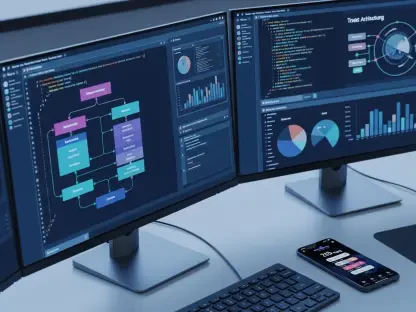The Rise of AI in Software Development
The software development landscape is undergoing a seismic shift, with artificial intelligence (AI) emerging as a cornerstone of modern innovation, transforming how developers approach their work. Today, AI tools are no longer mere novelties but essential components integrated into the workflows of millions of developers worldwide. Their adoption has surged, driven by the promise of streamlining complex tasks and accelerating project timelines in an industry where speed and precision are paramount. This transformation reflects a broader trend in technology, where automation and intelligent systems are redefining traditional roles and processes.
Key players such as Microsoft, the parent company of GitHub, alongside OpenAI, Google DeepMind, and Anthropic, are at the forefront of this revolution. These organizations have developed cutting-edge tools and platforms that dominate the market, from language models to comprehensive development environments. Their contributions have not only fueled competition but also fostered collaboration, as integrations between platforms like Visual Studio Code and cloud services become commonplace, amplifying their reach and impact across diverse sectors.
The scope of AI-driven development tools extends far beyond simple code suggestions, now encompassing entire project lifecycles with significant productivity gains. Generative AI and emerging agentic systems, capable of autonomous decision-making, are setting new benchmarks for what technology can achieve. These advancements pave the way for tools like GitHub Copilot to evolve from basic assistants into indispensable partners, reshaping how software is conceptualized, built, and maintained in a rapidly advancing digital era.
GitHub Copilot’s Transformation into a Multi-Model Agentic Assistant
Key Technological Advancements
GitHub Copilot has undergone a remarkable evolution, transitioning from a code completion tool to a sophisticated multi-model agentic assistant. Recent updates, including Agent Mode and specialized Coding Agents, empower Copilot to autonomously tackle high-level objectives by breaking them into manageable subtasks, generating files, and even self-correcting errors. This marks a significant leap, positioning Copilot as a virtual peer that actively contributes to the development process rather than merely reacting to inputs.
Further innovations like Copilot Edits enable seamless multi-file modifications through natural language instructions, simplifying complex updates across projects. The introduction of a multi-model architecture allows developers to select from a range of Large Language Models (LLMs) tailored to specific needs, balancing factors like task complexity and latency. Additionally, specialized agents for cloud development, such as those focused on site reliability engineering, automate critical responses to production challenges, enhancing operational efficiency.
These advancements collectively illustrate a shift in Copilot’s role, moving beyond basic assistance to proactive problem-solving. Features like multi-file changes and self-correction mechanisms ensure greater accuracy and reduce the cognitive load on developers. As a result, Copilot is redefining the boundaries of human-machine collaboration, offering a glimpse into a future where AI handles intricate workflows with minimal oversight.
Impact on Productivity and Market Dynamics
The impact of Copilot’s transformation on developer productivity is profound, with studies indicating a 55% reduction in task completion time for users. This statistic underscores the tool’s ability to automate repetitive and complex processes, such as debugging and code reviews, allowing professionals to focus on strategic aspects like system architecture. Forecasts suggest that ongoing enhancements will push these efficiency gains even higher in the coming years, further solidifying Copilot’s value.
Beyond individual benefits, Copilot is reshaping the broader tech market by democratizing coding expertise and improving code quality through automated standards enforcement. This accessibility lowers barriers for novice developers while enabling seasoned professionals to oversee larger, more intricate projects. Developer roles are evolving into ones of strategic management, where oversight of AI-driven outputs takes precedence over manual coding, signaling a fundamental change in job dynamics.
On a market level, Microsoft’s dominance in developer tools is strengthened through Copilot’s integrations with platforms like Azure AI, creating a robust ecosystem that competitors struggle to match. The increased demand for LLMs and cloud services benefits providers like Amazon Web Services and Google Cloud, while niche opportunities emerge for startups focusing on AI security and observability. This competitive shift highlights a growing preference for integrated, agentic solutions that enhance the entire development lifecycle.
Challenges in Adopting Advanced AI Assistants
The integration of advanced AI tools like Copilot into everyday workflows is not without hurdles, particularly concerning data privacy. As these systems process proprietary code, the risk of sensitive information exposure remains a pressing concern for enterprises. Ensuring robust encryption and secure data handling protocols is critical to maintaining trust and protecting intellectual assets in an increasingly connected digital environment.
Security vulnerabilities also loom large, especially as AI assistants gain broader access to system components, expanding potential attack surfaces. Over-reliance on such tools poses another challenge, with the danger of skill erosion among developers who may become too dependent on automation. This could impair their ability to detect errors or address novel challenges that fall outside the AI’s trained scope, necessitating a careful balance of human and machine input.
Intellectual property issues further complicate adoption, as AI-generated code may inadvertently replicate copyrighted material, raising legal uncertainties. The need for human oversight to validate outputs and implement safeguards cannot be overstated. Addressing these multifaceted risks requires a proactive approach, ensuring that the benefits of AI assistance do not come at the expense of security, expertise, or ethical integrity.
Regulatory and Ethical Landscape of AI in Development
Navigating the regulatory framework surrounding AI tools in software development is becoming increasingly complex as their adoption widens. Data protection laws, such as those enforced globally, demand strict compliance to prevent misuse of personal or proprietary information processed by these systems. Organizations must prioritize adherence to such regulations to avoid legal repercussions and maintain operational credibility in a scrutinized market.
Ethical considerations add another layer of complexity, with potential biases in AI outputs posing risks of unfair or unreliable results. Questions of ownership over AI-generated content remain unresolved, creating ambiguity around rights and responsibilities. Transparency in how these tools operate, including clear documentation of decision-making processes, is essential to foster trust among users and stakeholders alike.
The establishment of industry standards and governance frameworks is imperative to ensure the secure and equitable deployment of agentic AI systems. Collaborative efforts among tech leaders, policymakers, and developers are needed to define best practices that address accountability and fairness. Only through such measures can the full potential of AI in development be realized without compromising ethical or legal principles.
Future Horizons for GitHub Copilot and AI in Software Development
Looking ahead, GitHub Copilot is poised for even greater adoption of agentic features across diverse development environments. Near-term prospects include the integration of multi-modal capabilities, such as generating user interface code directly from design mockups, enhancing the tool’s versatility. These advancements promise to make development more intuitive, bridging gaps between conceptual design and functional implementation.
Longer-term visions point to multi-agent collaboration, where teams of AI agents work in tandem to manage entire projects, from planning to execution. Concepts like self-optimizing codebases and AI-driven project management could redefine efficiency, while app modernization for legacy systems emerges as a key focus area. Such innovations indicate a trajectory toward fully autonomous development ecosystems, fundamentally altering traditional methodologies.
Global economic conditions, alongside rapid advancements in AI models and shifting developer preferences, will shape these future directions. Economic stability could accelerate investment in AI infrastructure, while novel model architectures may unlock new functionalities. Developer demand for seamless, adaptable tools will continue to drive innovation, ensuring that solutions like Copilot remain responsive to the evolving needs of the industry.
Conclusion: Balancing Innovation and Responsibility
Reflecting on the journey of GitHub Copilot, its ascent into a multi-model agentic assistant stands as a defining moment in software development history. The tool’s ability to enhance productivity and redefine workflows marks a significant milestone, positioning AI as an integral partner in coding endeavors. Its influence reverberates across the industry, spurring competition and opening new avenues for technological growth.
Yet, the path forward demands careful navigation of persistent challenges like security vulnerabilities and ethical dilemmas. Stakeholders need to prioritize the development of advanced safeguards to protect data and maintain trust. Investing in comprehensive training programs for developers ensures that human expertise complements AI capabilities, preventing skill degradation over time.
Moving ahead, the focus shifts to fostering collaborative frameworks that balance AI autonomy with human oversight. Industry leaders must advocate for standardized metrics to evaluate AI performance, ensuring reliability across applications. By championing responsible innovation, the tech community can harness the transformative power of tools like Copilot, paving the way for a future where technology amplifies human potential without overshadowing it.









